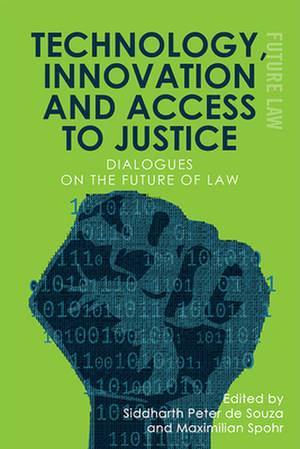Technology, Innovation and Access to Justice: Future Law
Editat de Siddharth Peter de Souza, Maximilian Spohren Limba Engleză Hardback – 19 ian 2021
Toate formatele și edițiile
| Toate formatele și edițiile | Preț | Express |
|---|---|---|
| Paperback (1) | 174.42 lei 3-5 săpt. | |
| EDINBURGH UNIVERSITY PRESS – 16 ian 2023 | 174.42 lei 3-5 săpt. | |
| Hardback (1) | 644.97 lei 3-5 săpt. | |
| EDINBURGH UNIVERSITY PRESS – 19 ian 2021 | 644.97 lei 3-5 săpt. |
Preț: 644.97 lei
Preț vechi: 782.37 lei
-18% Nou
Puncte Express: 967
Preț estimativ în valută:
123.45€ • 134.14$ • 103.77£
123.45€ • 134.14$ • 103.77£
Carte disponibilă
Livrare economică 31 martie-14 aprilie
Preluare comenzi: 021 569.72.76
Specificații
ISBN-13: 9781474473866
ISBN-10: 1474473865
Pagini: 320
Dimensiuni: 163 x 241 x 27 mm
Greutate: 0.61 kg
Editura: EDINBURGH UNIVERSITY PRESS
Seria Future Law
ISBN-10: 1474473865
Pagini: 320
Dimensiuni: 163 x 241 x 27 mm
Greutate: 0.61 kg
Editura: EDINBURGH UNIVERSITY PRESS
Seria Future Law
Notă biografică
Siddharth Peter de Souza is a research fellow and PhD candidate at the Humboldt University of Berlin.
Maximilian Spohr is Policy Advisor on Civil Rights and Digitisation at the Friedrich Naumann Foundation for Freedom, primarily leading the foundation's international human rights program. He holds a PhD in Public International Law from the University of Heidelberg.
Maximilian Spohr is Policy Advisor on Civil Rights and Digitisation at the Friedrich Naumann Foundation for Freedom, primarily leading the foundation's international human rights program. He holds a PhD in Public International Law from the University of Heidelberg.
Cuprins
Foreword
Maurits Barendrecht
1. Introduction - Making Access to Justice Count: Debating the Future of Law
Siddharth Peter de Souza and Maximilian Spohr
Part I: Mapping the Private Sector
2. How Can Law Firms Contribute to Access to Justice in an Age of Technology and Digitalisation? Pro Bono, Law Firm Innovation and Ideas for the Legal Community
Özgür Kahale
3. How Technology Is Changing the Nature of Work and Altering the Practice of Law
Suzanna Kalendzhian
4. Future of Law - Increasing the Access to Justice through Technology
Odunoluwa Longe
5. The Future of Law: Technology, Innovation and Access to Justice in Legal Services around the World
Roger Smith
Part II: Smart Government: Building Responsive Future-Ready Institutions
6. Automating Government Decision-making: Implications for the Rule of Law
Monika Zalnieriute, Lyria Bennett Moses and George Williams
7. Sustainable AI Development (SAID): On the Road to More Access to Justice
Christian Djeffal
8. Digital Justice: Nice to Have But Hard to Achieve
Dory Reiling
9. Improving Access to Justice Through Social Media Service of Process In Germany: Thinking Outside The (In)box
Cedric Vanleenhove
Part III: Civil Society: Realizing the Implications of Technology Change
10. Gamified Digital Advocacy and the Future of Law
Gianluca Sgueo
11. Communicating the Law: Thinking through Design, Visuals and Presentation of Legal Content
Siddharth Peter de Souza
12. Digital Rights and Data Protection
Alistair Alexander & Mira Suleimenova
13. Friend or foe?: Examining the Potential and Pitfalls of ICTs in Improving Access to Justice in Post-Conflict Countries
Astrid Wiik
Part IV: Reflecting on Legal Education in the Future
14. Elements of a Strategic Roadmap to Legal Education and Accreditation in the Digital Environment
Ana Paula Camelo & Claudio Lucena
15. Challenges and Opportunities: Engaging a Reluctant Profession in Its Own Future
Aviva Rotenberg
16. The Long and Short of It: How Legal Education Can Help Solve the Profession's Identity Crisis
Maeve Lavelle
17. Teaching Law after the #feesmustfall Protests - How Technology Saved the Day at UWC
Angelo Dube
Maurits Barendrecht
1. Introduction - Making Access to Justice Count: Debating the Future of Law
Siddharth Peter de Souza and Maximilian Spohr
Part I: Mapping the Private Sector
2. How Can Law Firms Contribute to Access to Justice in an Age of Technology and Digitalisation? Pro Bono, Law Firm Innovation and Ideas for the Legal Community
Özgür Kahale
3. How Technology Is Changing the Nature of Work and Altering the Practice of Law
Suzanna Kalendzhian
4. Future of Law - Increasing the Access to Justice through Technology
Odunoluwa Longe
5. The Future of Law: Technology, Innovation and Access to Justice in Legal Services around the World
Roger Smith
Part II: Smart Government: Building Responsive Future-Ready Institutions
6. Automating Government Decision-making: Implications for the Rule of Law
Monika Zalnieriute, Lyria Bennett Moses and George Williams
7. Sustainable AI Development (SAID): On the Road to More Access to Justice
Christian Djeffal
8. Digital Justice: Nice to Have But Hard to Achieve
Dory Reiling
9. Improving Access to Justice Through Social Media Service of Process In Germany: Thinking Outside The (In)box
Cedric Vanleenhove
Part III: Civil Society: Realizing the Implications of Technology Change
10. Gamified Digital Advocacy and the Future of Law
Gianluca Sgueo
11. Communicating the Law: Thinking through Design, Visuals and Presentation of Legal Content
Siddharth Peter de Souza
12. Digital Rights and Data Protection
Alistair Alexander & Mira Suleimenova
13. Friend or foe?: Examining the Potential and Pitfalls of ICTs in Improving Access to Justice in Post-Conflict Countries
Astrid Wiik
Part IV: Reflecting on Legal Education in the Future
14. Elements of a Strategic Roadmap to Legal Education and Accreditation in the Digital Environment
Ana Paula Camelo & Claudio Lucena
15. Challenges and Opportunities: Engaging a Reluctant Profession in Its Own Future
Aviva Rotenberg
16. The Long and Short of It: How Legal Education Can Help Solve the Profession's Identity Crisis
Maeve Lavelle
17. Teaching Law after the #feesmustfall Protests - How Technology Saved the Day at UWC
Angelo Dube
Descriere
Descriere de la o altă ediție sau format:
Around four billion people globally are unable to address their everyday legal problems and do not have the security, opportunity or protection to redress their grievances and injustices.
Around four billion people globally are unable to address their everyday legal problems and do not have the security, opportunity or protection to redress their grievances and injustices.






